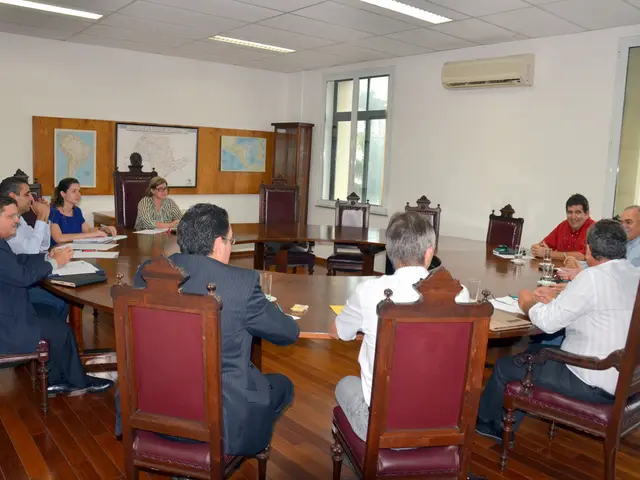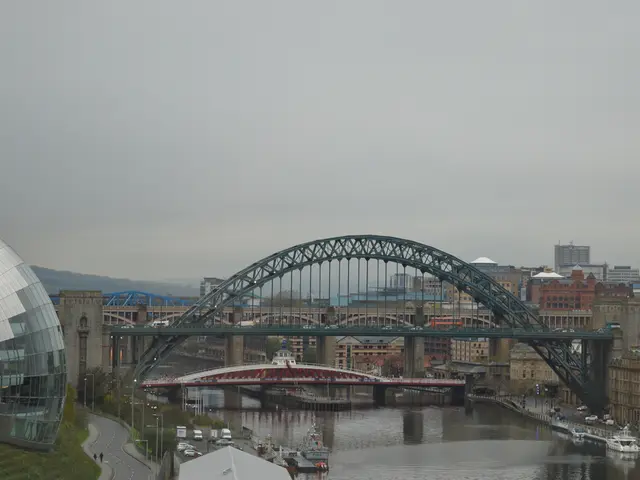Migrant Return Facility: Two Individuals Deported to Poland from Eisenhüttenstadt
Transfer of Individuals: Delivery of Two Persons to Polish Authorities - Relocation Facility Transfers: Two Individuals Moved to Poland
Welcome to Eisenhüttenstadt! Since the inception of the novel migrant return center in this town back in March, two asylum seekers have been transferred to Poland. This information was confirmed by the Interior Ministry of Potsdam upon our inquiry. Known as the Dublin center, it formally began operations in mid-March and is designed to accommodate about 250 people.
The center, now around seven weeks old, targets streamlining the return of asylum seekers without valid permits to Poland. It primarily deals with what are known as Dublin cases - individuals who should go through their asylum process in another EU state due to existing regulations. The ministry refers to such transfers as 'relocations.'
These deportations involved individuals who were registered in Poland for the very first time and were claimed by Poland for responsibility, stated the Interior Ministry. The transfers occurred at Swiecko, and it's important to note that there's a German-Polish police station in this border region near Frankfurt (Oder) as well.
Faeser signed the agreement in Potsdam
The agreement for setting up the center was sealed between the previous Federal Government and Federal Minister of the Interior, Nancy Faeser (SPD) and Brandenburg’s Minister of the Interior, Katrin Lange (SPD), back in February. This makes Eisenhüttenstadt the second Dublin center in Germany, following Hamburg. Some details discussed included making the deportation process more efficient, for example, relocating multiple individuals at once. The Refugee Council of Brandenburg strongly criticized the center's inauguration.
The Dublin procedure regulates that, in many cases, the state is responsible for handling the asylum process in the country the refugee initially set foot on in the EU. If refugees travel to other EU states and only submit their asylum application there - a common occurrence in Germany - the country of first entry must take them back under specific conditions.
It's worth pointing out that the benefits for these asylum seekers are minimized in these centers. They are primarily given essential items such as food, lodging, and soap, and there is no pocket money allocated. Only recently, the Social Court in Hamburg ruled that the restrictions on asylum seeker benefits in these centers may not be enacted without further scrutiny.
- Eisenhüttenstadt
- Immigration
- Poland
- Asylum seekers
- Return center
- EU
- Ministry of the Interior
- Potsdam
- Nancy Faeser
- SPD
- Katrin Lange
- Germany
- Refugees
- Hamburg
Even under the current government, recent announcements suggest stricter border controls and asylum restrictions as of May 6, 2025, along with limiting asylum applications and strengthening returns[1]. While specific details about the Eisenhüttenstadt center remain scant, such facilities typically involve detention centers for individuals awaiting deportation or border processing. Individuals considered for deportation might face challenges related to systemic racism, far-right networks within German authorities, and distrust in state institutions[2]. It is advisable to consult the official German federal or Brandenburg state immigration authorities for more precise details about the Eisenhüttenstadt center. Further expansion of centers like this one may be part of larger localized operational adjustments not yet fully reflected in public sources.
- The recent announcements by the current government hint at stricter border controls and asylum restrictions, effective from May 6, 2025, including limiting asylum applications and strengthening returns.
- The Eisenhüttenstadt return center, opened in March, has been criticized by the Refugee Council of Brandenburg for its potential impact on asylum seekers.
- Individuals deported from the Eisenhüttenstadt center have faced challenges, such as systemic racism, far-right networks within German authorities, and distrust in state institutions.
- Future expansion of centers like the one in Eisenhüttenstadt could be part of larger localized operational adjustments not yet fully reflected in public sources.







